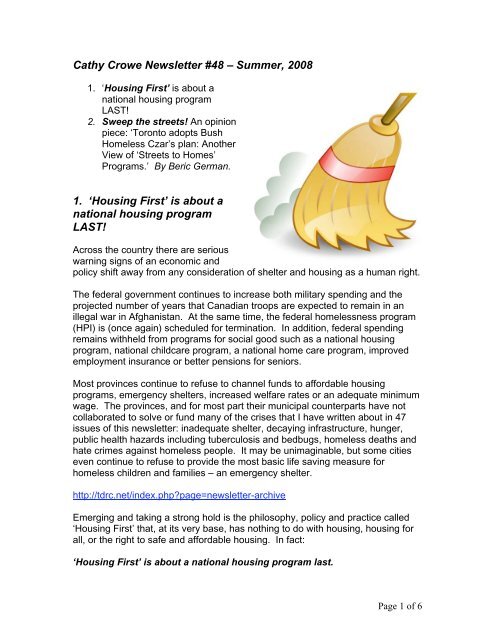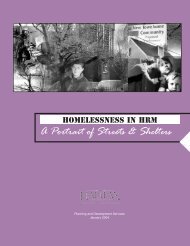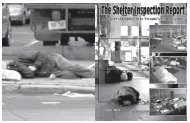Cathy Crowe Newsletter #48 - Toronto Disaster Relief Committee
Cathy Crowe Newsletter #48 - Toronto Disaster Relief Committee
Cathy Crowe Newsletter #48 - Toronto Disaster Relief Committee
You also want an ePaper? Increase the reach of your titles
YUMPU automatically turns print PDFs into web optimized ePapers that Google loves.
<strong>Cathy</strong> <strong>Crowe</strong> <strong>Newsletter</strong> <strong>#48</strong> – Summer, 2008<br />
1. ‘Housing First’ is about a<br />
national housing program<br />
LAST!<br />
2. Sweep the streets! An opinion<br />
piece: ‘<strong>Toronto</strong> adopts Bush<br />
Homeless Czar’s plan: Another<br />
View of ‘Streets to Homes’<br />
Programs.’ By Beric German.<br />
1. ‘Housing First’ is about a<br />
national housing program<br />
LAST!<br />
Across the country there are serious<br />
warning signs of an economic and<br />
policy shift away from any consideration of shelter and housing as a human right.<br />
The federal government continues to increase both military spending and the<br />
projected number of years that Canadian troops are expected to remain in an<br />
illegal war in Afghanistan. At the same time, the federal homelessness program<br />
(HPI) is (once again) scheduled for termination. In addition, federal spending<br />
remains withheld from programs for social good such as a national housing<br />
program, national childcare program, a national home care program, improved<br />
employment insurance or better pensions for seniors.<br />
Most provinces continue to refuse to channel funds to affordable housing<br />
programs, emergency shelters, increased welfare rates or an adequate minimum<br />
wage. The provinces, and for most part their municipal counterparts have not<br />
collaborated to solve or fund many of the crises that I have written about in 47<br />
issues of this newsletter: inadequate shelter, decaying infrastructure, hunger,<br />
public health hazards including tuberculosis and bedbugs, homeless deaths and<br />
hate crimes against homeless people. It may be unimaginable, but some cities<br />
even continue to refuse to provide the most basic life saving measure for<br />
homeless children and families – an emergency shelter.<br />
http://tdrc.net/index.php?page=newsletter-archive<br />
Emerging and taking a strong hold is the philosophy, policy and practice called<br />
‘Housing First’ that, at its very base, has nothing to do with housing, housing for<br />
all, or the right to safe and affordable housing. In fact:<br />
‘Housing First’ is about a national housing program last.<br />
Page 1 of 6
‘Housing First’ is about raising social assistance rates last.<br />
‘Housing First’ is about ending hunger last.<br />
‘Housing First’ is the new mantra being used to introduce and justify economic<br />
policies that ensure further withdrawal of life-saving aid to a suffering population.<br />
As Naomi Klein would say “We have been shocked”. In her groundbreaking<br />
book Shock Doctrine – The Rise of <strong>Disaster</strong> Capitalism Klein outlines numerous<br />
examples of populations who, already devastated by disaster and tragedy such<br />
as the Tsunami or Hurricane Katrina, then suffer an even worst fate at the hands<br />
of politicians, developers and governments who take advantage of chaos and<br />
crisis to introduce what would have normally been considered regressive<br />
policies.<br />
http://tdrc.net/index.php?page=41---january-2008---the-shock-doctrine<br />
Extreme street sweeps of homeless people, always predictable during cities’<br />
Olympics, visits by Popes and Queens and summer tourism season are now a<br />
matter of course and policy in Canadian cities. It may be called ‘Housing First’,<br />
Streets to Homes, Hostels to Homes or a ‘10 year plan to end homelessness’ in<br />
your city. Whatever it’s called it warrants that we examine the program more<br />
closely. Listen to the frontline workers and activists. Beric German below writes<br />
on the <strong>Toronto</strong> experience, informed by the many homeless people and frontline<br />
workers that have spoken to him.<br />
<strong>Cathy</strong><br />
2. <strong>Toronto</strong> adopts Bush Homeless Czar’s plan: Another View of<br />
‘Streets to Homes’ Programs<br />
Phillip Mangano, often referred to as Bush’s homelessness czar, has been<br />
travelling around North America promoting what he calls a “housing first” policy.<br />
He and the Bush administration, and more recently the Harper government, are<br />
concentrating on what they refer to as “street homelessness” (those people<br />
visibly living on the street), as opposed to fully funding national housing programs<br />
with appropriate supports. The City of <strong>Toronto</strong> has already swallowed his bait,<br />
and is expanding their “streets to homes” program under the guise of dealing with<br />
panhandling in downtown <strong>Toronto</strong>. Rejecting the creation of new panhandling<br />
laws, they’re hiring 48 new housing and social workers.<br />
Efforts by the <strong>Toronto</strong> <strong>Disaster</strong> <strong>Relief</strong> <strong>Committee</strong> (TDRC) had resulted in<br />
Canadian cities, mayors, homeless advocates, and organizations declaring<br />
homelessness a National <strong>Disaster</strong> in 1998. A quote from Mangano seems to<br />
show that not only does he agree, but he’s going to do something about it. He<br />
Page 2 of 6
says, “Can we reach into this disaster, and pull out something that will be helpful<br />
to historically homeless people? I think the answer to that is yes.”<br />
The US got hit with his barrage earlier than Canada, and by 2006, 220<br />
communities across the US were adopting his policies. Homelessness was<br />
becoming ugly and particularly evident in the centres of commerce, the US’<br />
largest cities. The blight of panhandling and the encumbering of sidewalks<br />
became too much, and the visibility of homelessness was becoming a national<br />
“disgrace” – a word activists use interchangeably with disaster. Mangano’s voice<br />
seems proactive. “We are no longer content to simply manage the crisis; we’re<br />
beginning to end the disgrace.”<br />
Mangano is a strong supporter of the Bush administration, which financially<br />
promotes and funds his “street homeless” approach. He equates his mission with<br />
the abolition of slavery and in regards to homelessness he refers to himself as an<br />
“abolitionist”. When he refers to the Republicans, who are slashing and burning<br />
social and housing programs, he says “Republicans ended slavery and they’ll<br />
end homelessness too.”<br />
“Weapons of mass displacement”<br />
But by “end homelessness”, Mangano means remove the visible homeless from<br />
the wealthy urban centres – simply move them out of sight. A critic from San<br />
Francisco refers to the Bush-Mangano approach as “weapons of mass<br />
displacement” (WMD). In <strong>Toronto</strong>, we can see this in the fact that the <strong>Toronto</strong><br />
Community Housing units given to “streets to homes” clients are those that have<br />
already been rejected three times by people on the affordable housing waiting<br />
list.<br />
Like Bush, Mangano is a propagandist extraordinaire. At times you might think<br />
that he is a housing activist, and he seems to share our views on “housing first”.<br />
For example, housing activists and even <strong>Toronto</strong>’s seemingly soft approach, do<br />
not agree with new panhandling laws. And Mangano too, has made strong<br />
statements on radio and elsewhere that punitive police approaches don’t work.<br />
Yet there remains no call in <strong>Toronto</strong> or elsewhere to end these police activities.<br />
Critics in the US and Canada agree that the soft approach doesn’t eliminate the<br />
role of police to make sure that city centres are pristine and free of beggars. It is<br />
not what is said or written down that matters, but what in reality happens. US<br />
critics point out that diminishing downtown street homelessness is accompanied<br />
by an increase in rural homelessness. That is what happens when you are<br />
driven out of town.<br />
The Mangano show travels the continent, city after city, until both Canada and<br />
the US have taken up his vision nationally. It helps that he has a strong show-biz<br />
Page 3 of 6
ackground. He was both the agent and the manager of the famous musical<br />
groups Peter, Paul and Mary, and Buffalo Springfield.<br />
So, where are we at in <strong>Toronto</strong>, Canada and the US?<br />
We all agree that a housing first position is reasonable. So now what? Officials<br />
have adopted activists’ words, but their actions don’t reflect our meaning. In that<br />
sense, Canada’s (in)action position on housing issues is consistent with those of<br />
Mangano, Bush, or the conservative mayor of New York City, Michael<br />
Bloomberg. If there are minor differences, they are in tone and not substance.<br />
Long before neoliberalism, the adoption of the language of the opposition has<br />
been a necessary and wise component for those who might fool us. But<br />
neoliberalism is at play now, and this old tactic is being employed in more sinister<br />
and sometimes very popular ways. Phrases like, ‘the spread of democracy’ and<br />
even ‘housing first’ come to mind.<br />
In fact, “housing first” is language taken from the Conservative federal<br />
government’s HPI website: “The Homelessness Partnership Initiative (HPI) is the<br />
cornerstone of the Homelessness Partnering Strategy and takes a housing-first<br />
approach.” [homelessness.gc.ca/home/index_e.asp]<br />
In <strong>Toronto</strong>, the demise of the hostel system, including recent cuts removing 300<br />
shelter beds, came at a savings of approximately $5M per year, which was<br />
shared by the province and the city. The City’s strategy that purports to be about<br />
panhandling does not return these life-saving beds, so these savings came at the<br />
expense of the health of homeless people. At the same time, as part of the<br />
“housing first” strategy, workers are no longer allowed to provide blankets or food<br />
on the streets.<br />
The same criticism can be levelled at the provincial government when it doesn’t<br />
return the monies that were cut back by the Tories before them – including deep<br />
cuts to social assistance rates that pushed people onto the streets, and<br />
cancellation of thousands of affordable housing units. Consultations around<br />
poverty reduction are cheap and insulting when the government continues to<br />
ignore communities that ask: “where is the raise in welfare?”, “where is the<br />
housing?”, “where is the employment insurance?”, and “where is the<br />
higher minimum wage?”<br />
“This city, this country, should be ashamed, deeply ashamed.”<br />
As far as the cutbacks to hostels are concerned, consider Larry Scanlan’s<br />
response to visiting a couple of shelters during the winter of 2007-2008. He is a<br />
well known Canadian writer who went into the shelters to see for himself. His<br />
conclusion is instructive. “This city, this country, should be ashamed, deeply<br />
ashamed.”<br />
Page 4 of 6
There will be an ongoing debate between what city officials say about their<br />
delivery of services, and our view from the frontlines. Larry Scanlan’s direct<br />
observations confirm our serious concerns.<br />
If the city had sent out a clear message to the police to discontinue their present<br />
behaviour towards homeless people, advocates would feel more comfortable.<br />
The new “housing first” strategy, which is in fact the “streets to homes” strategy,<br />
has evolved alongside very serious brutality against the poor. This is consistent<br />
with the information on the New York model provided by frontline workers there<br />
during a visit by TDRC.<br />
Before the recent expansion of <strong>Toronto</strong>’s “streets to homes” program, frontline<br />
workers were already crying foul about how it was unravelling as City officials<br />
including police implement a neoliberal agenda at the expense of poor and<br />
homeless people.<br />
“Streets to homes” funding has been at the expense of shelters and other social<br />
services. Much of the city’s present spending on the project came from the<br />
federal government’s Homelessness Partnership Initiative (HPI), and while<br />
“streets to homes” got funded, other projects were cut back. The city continues<br />
to pressure agencies to reduce other support work and dedicate themselves to<br />
the “streets to homes” strategy.<br />
Now the city is expanding their policy, cleaning the streets, which is the real<br />
intent of “streets to homes”. Canadian neoliberal policy does not include a<br />
national housing program. Window-dressing will do just fine, and whenever we<br />
are asked about homelessness, local spokespeople, like <strong>Toronto</strong>’s Mayor Miller,<br />
General Manager of Shelter Housing and Support Phil Brown, and City<br />
Councillor Joe Mihevc, come forward with the revelation that large numbers of<br />
people are being housed. Questions remain about how and where they are<br />
housed.<br />
The “housing first” or “streets to homes” strategy is being used across North<br />
America. It has become the de-facto national housing program for Canada and<br />
its originator the US. On a daily basis, frontline workers and homeless people<br />
see how this works out in real life. We must consistently oppose this neoliberal<br />
policy. Again, Bush, Mangano, and the corporations are outmanoeuvring us.<br />
This regressive approach to homelessness cannot take the place of a fully<br />
funded national housing program and a fully funded emergency shelter system.<br />
It is very premature for congratulations regarding the achievement of<br />
decriminalization of homeless people. In the period between 2004 and 2007<br />
poor people in <strong>Toronto</strong> were being targeted and were a big focus of police<br />
attention. There was a whopping 288% increase in charges under the Safe<br />
Streets Act – up from 2,725 to 10,584. If the city is not to criminalize homeless<br />
Page 5 of 6
people, then it must send out a cease and desist order to police. The silence is<br />
deafening.<br />
Officially, homeless people are not to be criminalized or harassed, unofficially,<br />
the old policy remains in place. Homelessness is being defined as those people<br />
you can see openly in the streets of Canada’s large cities. We must be<br />
consistent, whether harassment is official or unofficial we must condemn it. And<br />
window-dressing in the downtown core will not replace a national housing<br />
program.<br />
Presently, the <strong>Toronto</strong> public is being told that the city is now dealing effectively<br />
and humanely with homelessness – in fact, just the opposite. One community<br />
worker at an agency for homeless people expresses a common view when<br />
describing the expansion of “streets to homes” with derision: “when there are<br />
vacancies in affordable-rent apartments, the buildings are extremely substandard<br />
and in unsafe areas that are plagued by drug-trafficking.” She<br />
adds, “It’s ridiculous to add [housing] workers without proper housing”.<br />
Even some of the most infamous slum landlords are rejecting “streets to homes”<br />
tenants.<br />
The program is expanding throughout Ontario with more than a nod from the<br />
Province. It has long been hoped that people would switch from the more<br />
expensive hostels to individual housing units. The new slogan is ‘hostels to<br />
homes’.<br />
Mangano’s plan, that of cleaning up cities’ downtown cores, has now been<br />
packaged and sold at the expense of a national housing program and with the<br />
creation of poorer conditions for people who are presently experiencing<br />
homelessness. As a recession approaches, we are left with poor tools to ride out<br />
what growing homelessness will bring.<br />
by Beric German, <strong>Toronto</strong> <strong>Disaster</strong> <strong>Relief</strong> <strong>Committee</strong> (TDRC)<br />
To reply or comment please write me at ccrowe@sherbourne.on.ca<br />
View <strong>Cathy</strong>'s previous newsletters and subscribe at:<br />
http://tdrc.net/index.php?page=newsletter.<br />
To unsubscribe/change profile: click here<br />
To subscribe: click here<br />
Thanks to Beric German for his opinion piece, Andrew Mindszenthy for<br />
editing, Anthony Rapoport for layout, design and web support.<br />
Page 6 of 6







